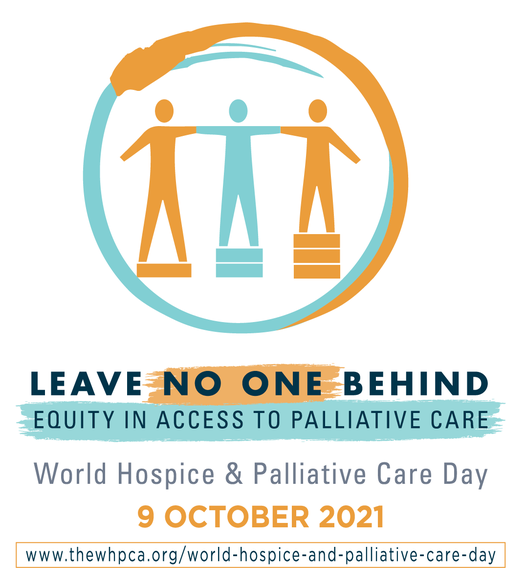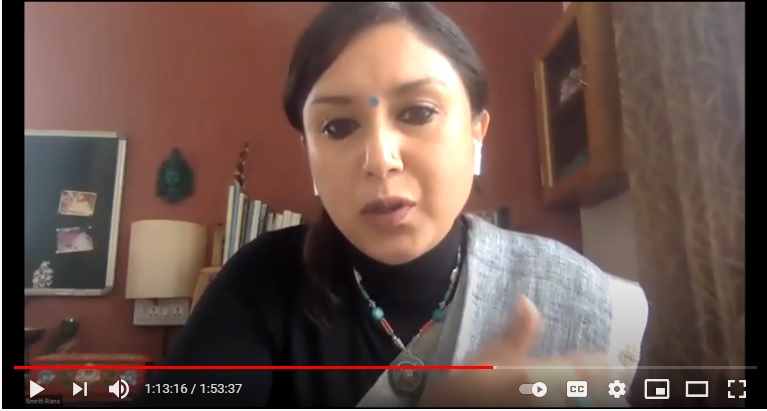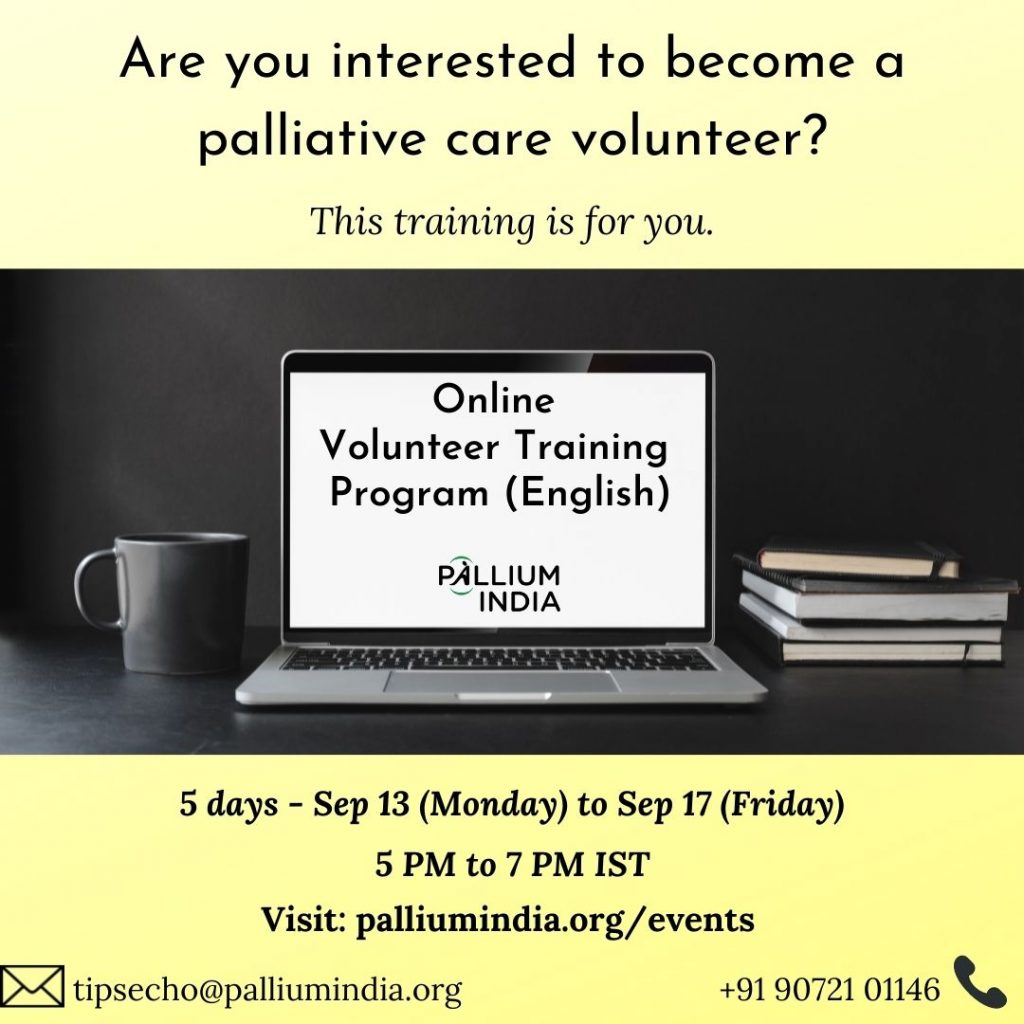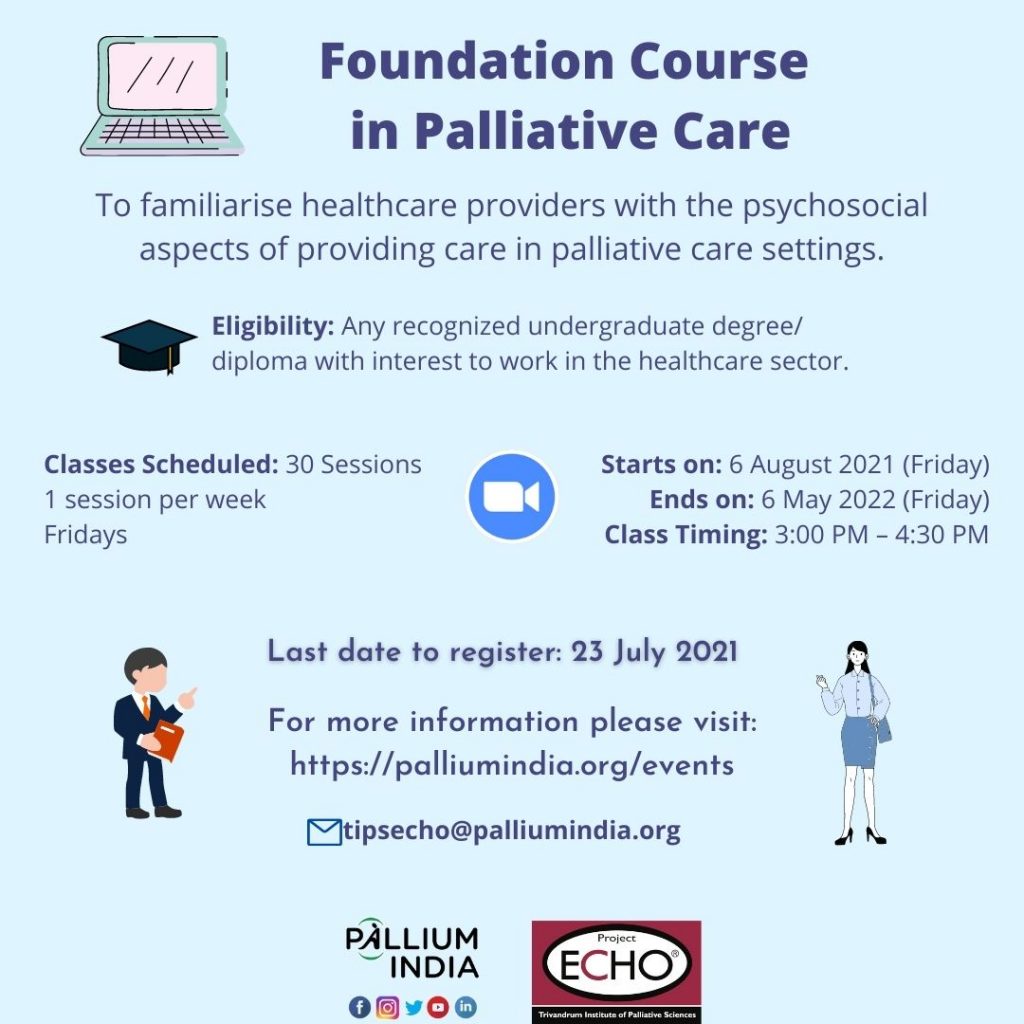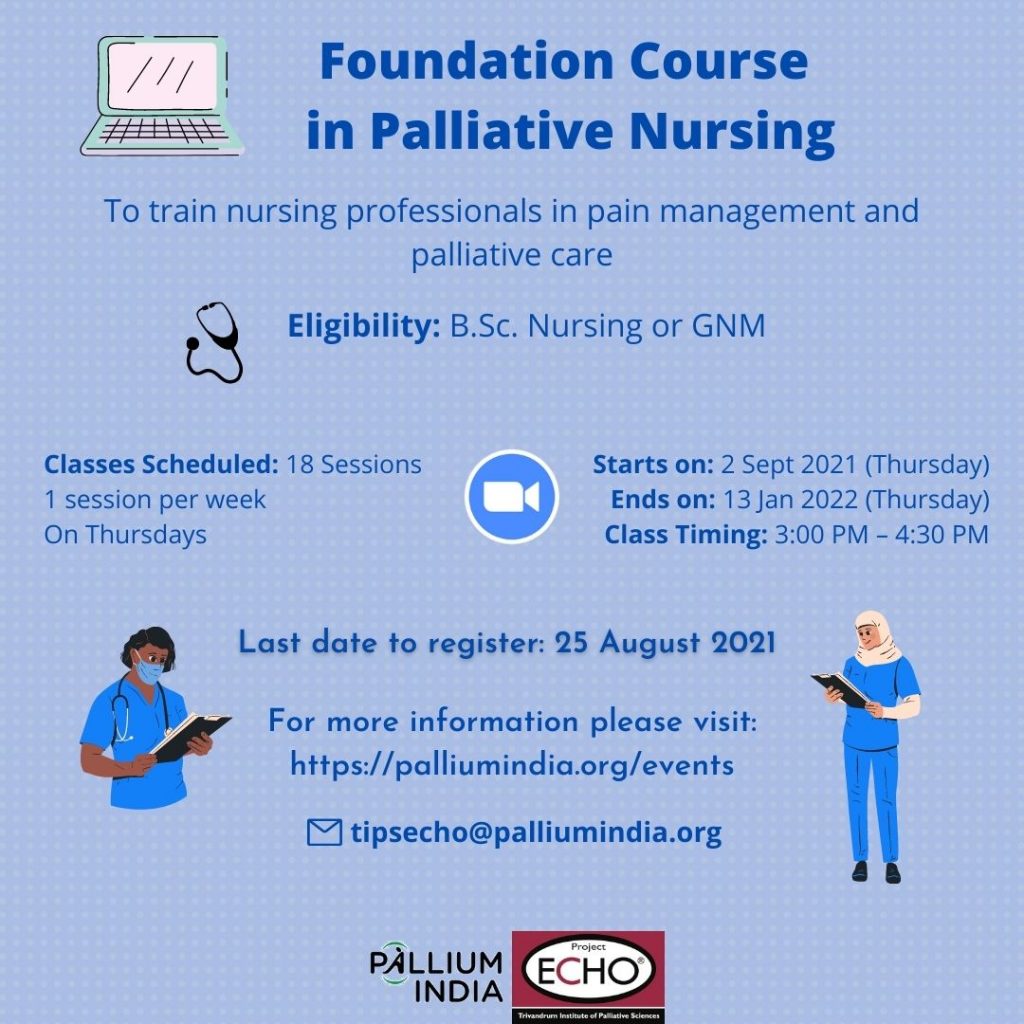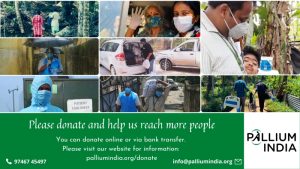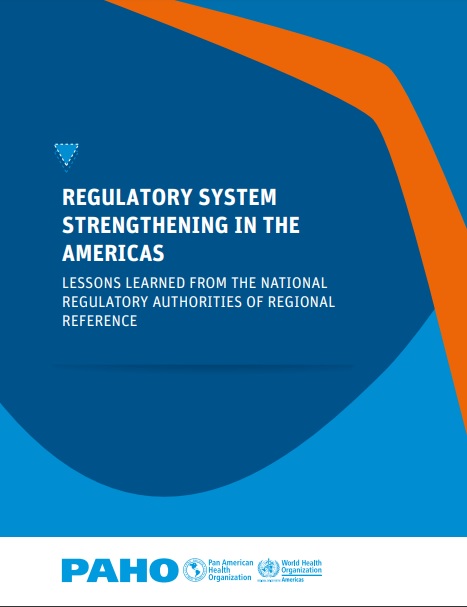August 2021

Click here to subscribe to our newsletter
Dear friends,
World Hospice and Palliative Care Day is a unified day of action to celebrate and support hospice and palliative care around the world. This year World Hospice and Palliative Care Day falls on Saturday, October 9, 2021.
This year’s theme is “LEAVE NO ONE BEHIND: Equity in Access to Palliative Care”.
If it is not to be just another slogan that we shout online on that day and then forget, we have to start planning now.
Equity is not just equality; those who need more care must get more. Who do we leave behind? Do we care about prisoners in serious health-related suffering? Do we really have special programs for women facing gender based issues even when seriously ill? Children? The abandoned elderly? Those living with disabilities?
If we start thinking now, perhaps by the 9th of October, every palliative care program would be able to address the issues of someone being left behind now!
Please take a look at the campaign toolkit from World Hospice Palliative Care Alliance (WHPCA).
Covid vaccine for patients under our care.

It has been on our conscience; we were unable to get patients under our care vaccinated against Covid-19. A news item on 02 June 2021 (Patients on palliative care to get Covid jabs) had raised our hopes, but progress has been slow. We were privileged to support the government program with vehicles and staff; yet we were able to get only 10% of our patients vaccinated.
Thanks to proactive action by the District Medical Officer’s office, we have been recognized as a vaccination centre and we hope to get our stock of vaccine this week itself. We should be able to get our patients vaccinated by next week hopefully. There will be challenges; but barriers are there to be overcome, right?
Video of the Month – Smriti Rana at VNGOC
Prevent & treat both kinds of suffering – addiction and unrelieved pain.
Do some of us get biased, and jump into battle – either fighting for the addiction issue, or for those in unrelieved pain?
On 13th July 2021, Smriti Rana (Pallium India’s Head – Policy/ Community Engagement/ Media) joined the Webinar for Civil Society with focus on Asia and Europe organized by Vienna NGO Committee on Drugs (VNGOC). She appealed to the United Nations Office on Drugs and Crime (UNODC) to adopt the principle of balance: let us consider it our duty to prevent & treat all suffering – both addiction and unrelieved pain. The World Drug Report 2021 was released at the event.
Click here to watch the recording: https://www.youtube.com/watch?v=4XfyTtVwYgI
Subscribe to Pallium India’s youtube channel for videos related to palliative care and our activities. You can watch previous webinars and training sessions, as well as listen to caregivers, survivors and others sharing their experiences.
Smriti says:
The 1961 Single Convention places on us all a dual obligation – to prevent the non-medical use of controlled substances, and EQUALLY, to ensure adequate availability of controlled substances for medical and scientific purposes.
The 2016 UN General Assembly Special Session outcome document explicitly reaffirms member states’ determination to help to ensure that all people can live in health, dignity and peace.
Health is defined by the WHO as not just the absence of infirmity and disease but also the presence of wellbeing.
How is true health, dignity, peace or wellbeing to exist in the presence of unmitigated pain?
The UNGASS declaration also clearly addresses availability and affordability issues. The problem, as is well known and acknowledged by the report, is predominantly of Low and Lower Middle Income Countries like ours, where the availability of internationally controlled drugs for medical and scientific purposes, including for the relief of pain and suffering, remains low to non-existent.
The Lancet Commission for palliative care and pain relief report of 2017, called this a “medical, public health, and moral failing, and a travesty of justice.”
An estimated 15 million people in South and South East Asia are experiencing severe, persistent pain and suffering.
What we need now more than ever is a well calibrated and smart regulatory system that maintains at its very heart the overarching goals of the United Nations – to protect health and human rights.
We seek a response to the urgent need for such smart regulations to increase access to opioid medications for medical and scientific purposes, while providing the additional guardrails of proper training and appropriate evidence-based information about the safe use of opioids for pain relief.
And we ask that the Commission on Narcotic Drugs ensures fit-for-purpose supply chains for controlled medicines in the future, both for COVID and for patients with palliative care needs.
Serious health-related suffering and palliative care in South Asian countries
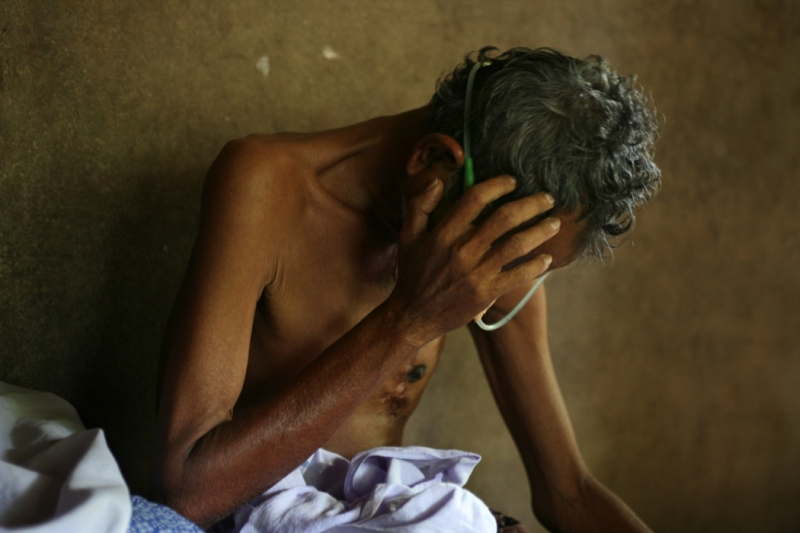
Ashwin Nambiar, Smriti Rana and M. R. Rajagopal point out in the Current Opinion in Supportive and Palliative Care: Serious health-related suffering and palliative care in South Asian countries
- 9.9 million people are in unrelieved Serious Health-related Suffering (SHS) in South Asian Countries due to lack of access to pain relief and palliative care, inappropriate EOLC and catastrophic health expenditure.
- Most South Asian countries do not have palliative care included in their health systems.
- In countries in which palliative care has been included as part of healthcare, implementation gaps impede access.
- Effective policies, programs and implementation, demonstration of successful initiatives, encouraging community and civil society participation and awareness, opioid access, palliative care education, institution of end-of-life care policies and need based research, together can relieve SHS at a low-cost.
View the video abstract: http://links.lww.com/COSPC/A30
New MD Palliative Medicine course in two colleges
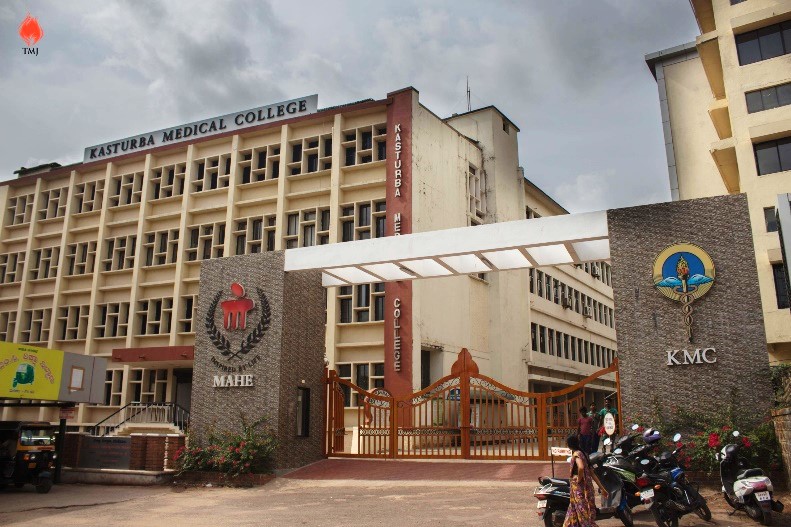
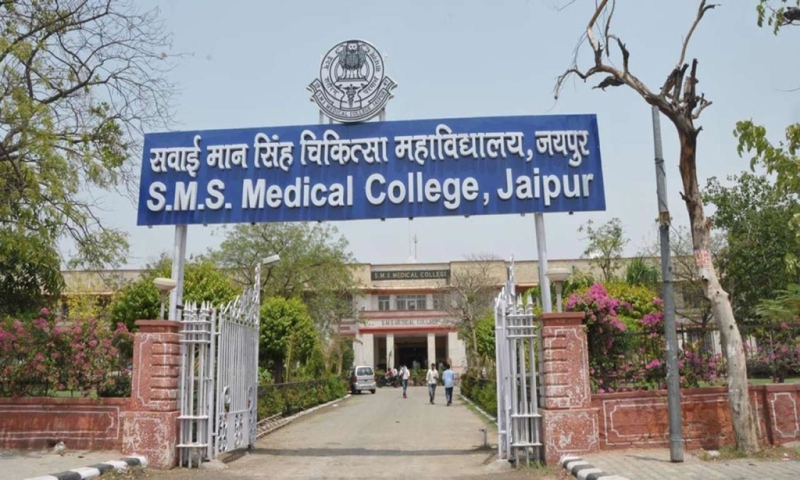
Kasturba Medical College, Manipal and Sawai Man Singh Medical College, Jaipur, have secured the approval from National Medical Commission to start MD Palliative Medicine (two seats per year).
Hearty Congratulations to Dr Naveen Salins and team at KMC Manipal, and Dr Ashwin Mathur and team at SMS Medical College, Jaipur. Best wishes.
The World remembers Elisabeth Kübler-Ross
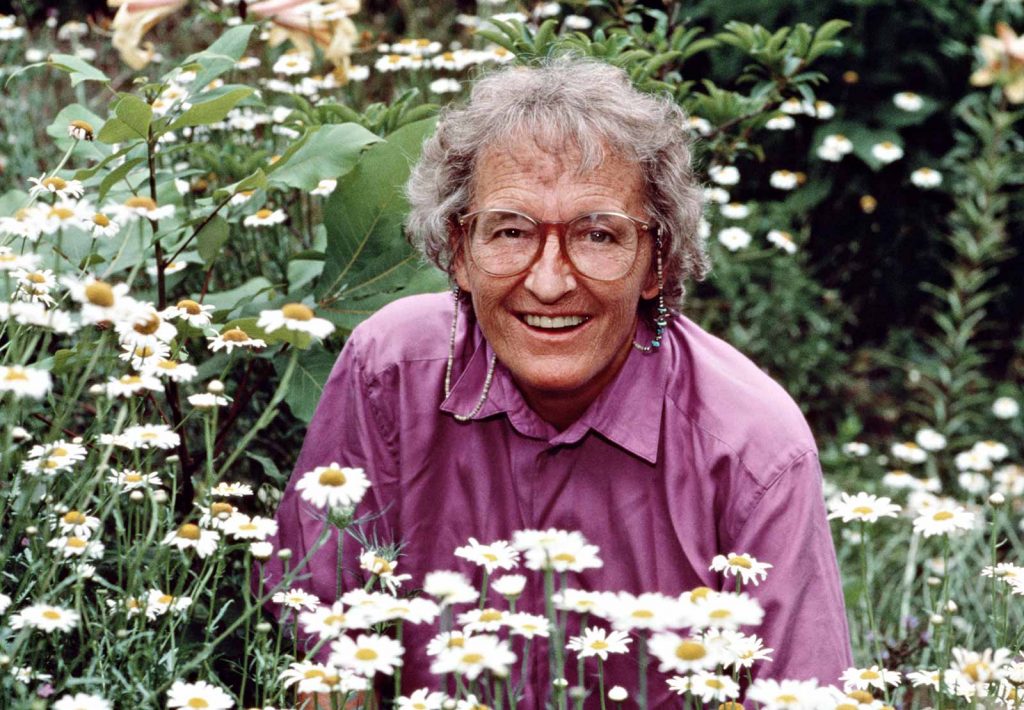
8 July 2021 was Dr Elisabeth Kübler-Ross‘ birthday. For the uninitiated, Dr Kübler-Ross was a Swiss-American psychiatrist, a pioneer in near-death studies, and author of several internationally best-selling books, including On Death and Dying.
Please listen to this podcast from Radiolabs about Dr Kübler-Ross’ journey: https://www.wnycstudios.org/podcasts/radiolab/articles/queen-dying
On 16th July 2021, Pallium India honored Elisabeth Kübler-Ross’ memory with an event organized and led by Ayana Ajithan and team.
The main attraction of the event titled ‘Remembering Elisabeth Kübler-Ross (EKR)’ was a quiz program in which doctors, nurses, pharmacists, physiotherapists and medical social workers participated enthusiastically. The three rounds comprised questions related to Dr Kübler-Ross, General, and Books & Quotes.
The participants were split into teams named Dignity, Compassion, Hope, Empathy, Comfort and Resilience.
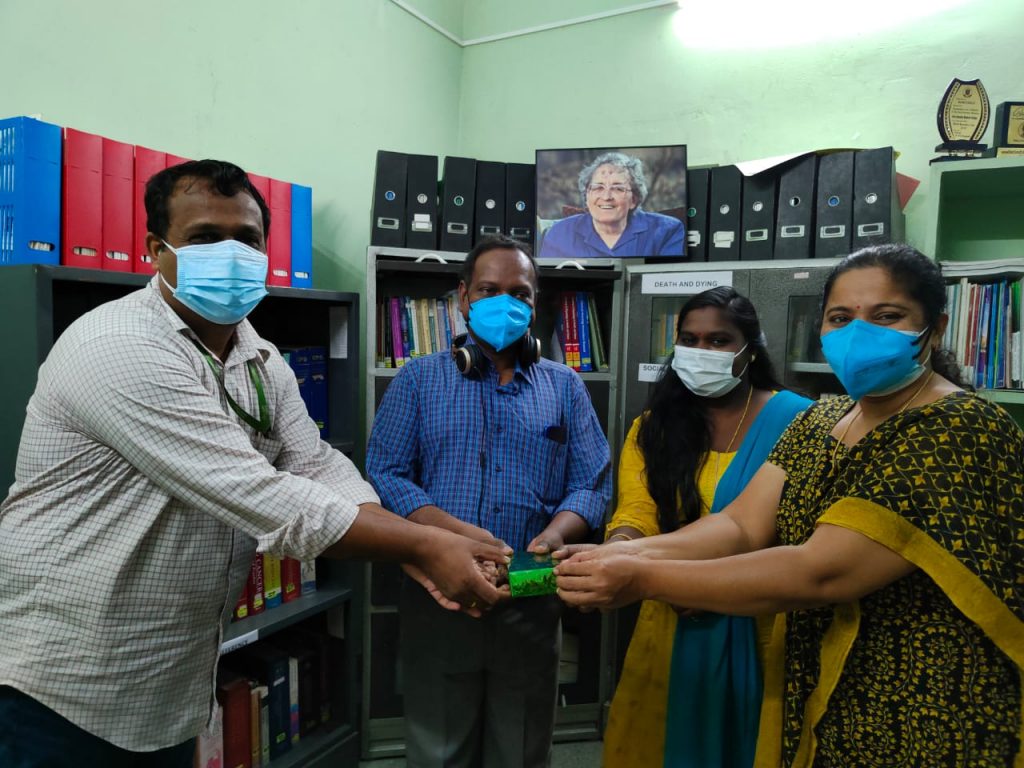
Winners: Team Compassion (nurses Seena, Anu and Kavitha, medical social workers Sarath and Babu Abraham and doctors Greeshma and Sreedevi)
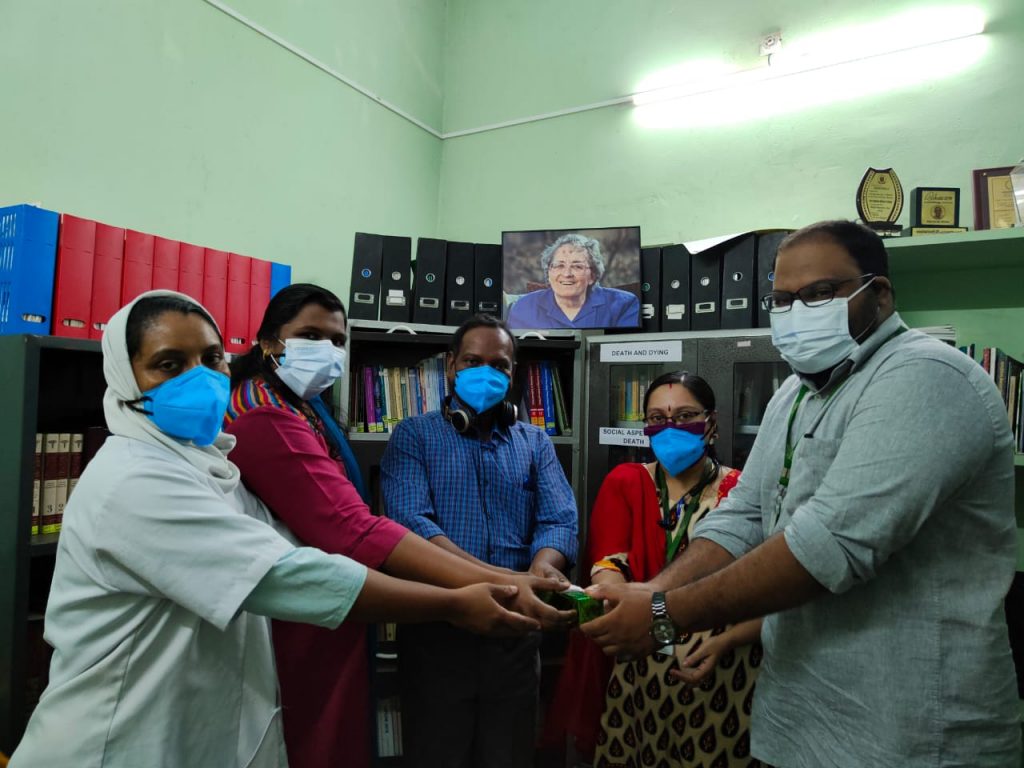
Runners-up: Team Hope (nurses Sherin, Sajan, Roshini, Nazeeba, medical social worker Manisha and doctors Arjun Devarajan and James).
Congratulations to all the participants and the winners, and also to the organizers for conducting an excellent program.


Upcoming Trainings in palliative care
- August 6, 2021: Online Foundation Course in Palliative Care (FCPC) for any graduate interested to work in health care.
- August 28, 2021: Online Certificate Course in Palliative Care (CCPC) for doctors.
- September 1, 2021: Online Foundation Course in Palliative Medicine (FCPM) for doctors.
- September 2, 2021: Online Foundation Course in Palliative Nursing (FCPN) for nurses.
- September 13, 2021: FREE Volunteer Training Program (Online) in English.
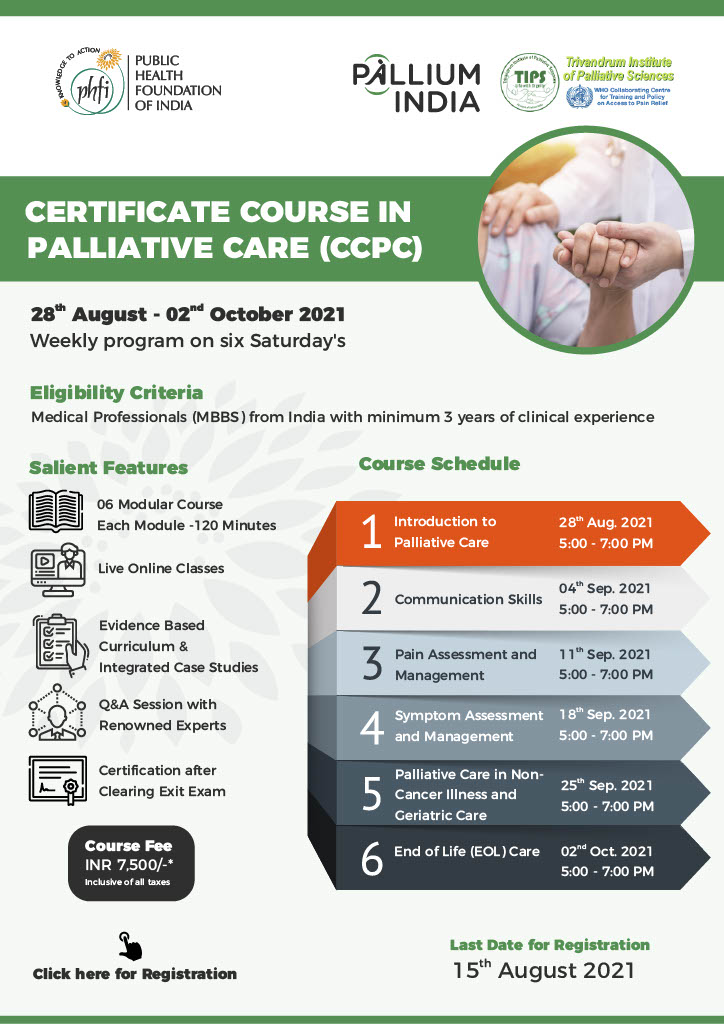
Check out all our upcoming events: https://palliumindia.org/events
For more information on any of these, write to: [email protected]
Follow us for palliative care news, views and updates – as & when they happen
IAPCON 2022 to be held between 11 & 13 February, 2022
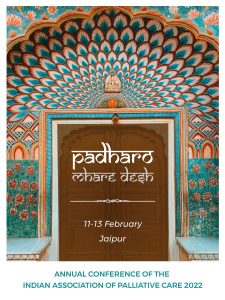
The organizing team of the Conference of Indian Association of Palliative Care (IAPCON) 2022, led by Dr. Anjum Joad from Jaipur, announces that IAPCON 2022 will be a virtual conference and will be held between 11th and 13th February, 2022.
IAHPC Photography Contest 2021

The International Association for Hospice and Palliative Care (IAHPC) invites members to participate in the 2021 IAHPC Photo Contest.
The deadline to submit your photos is August 31, 2021. The winners will be announced at the end of September. Click here to know more and to enter.
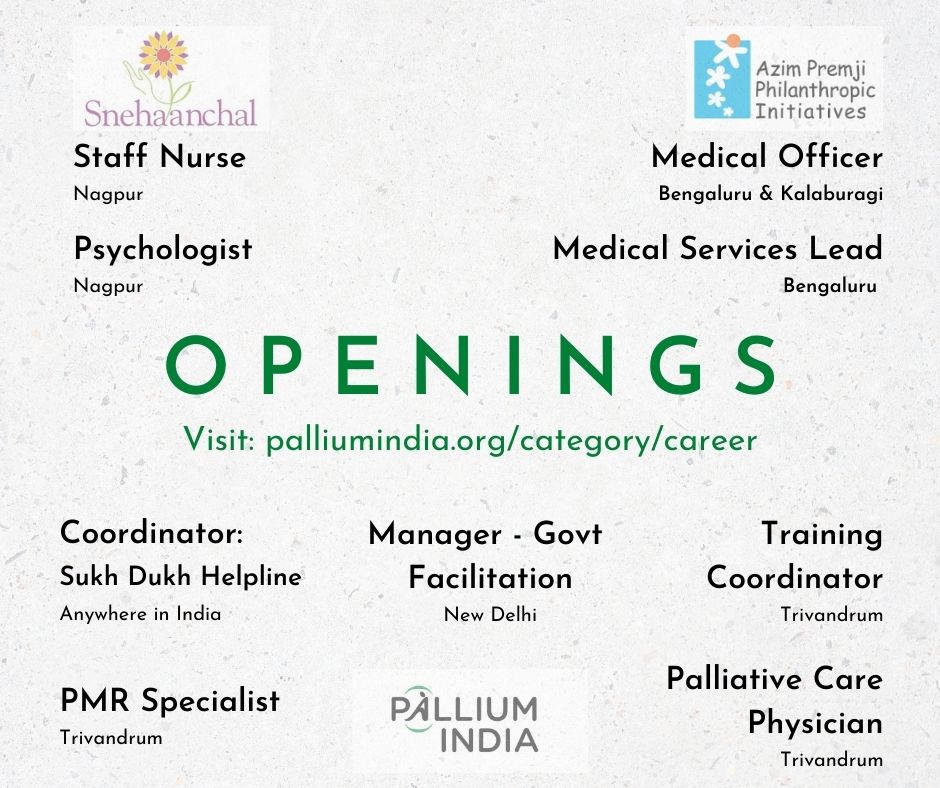
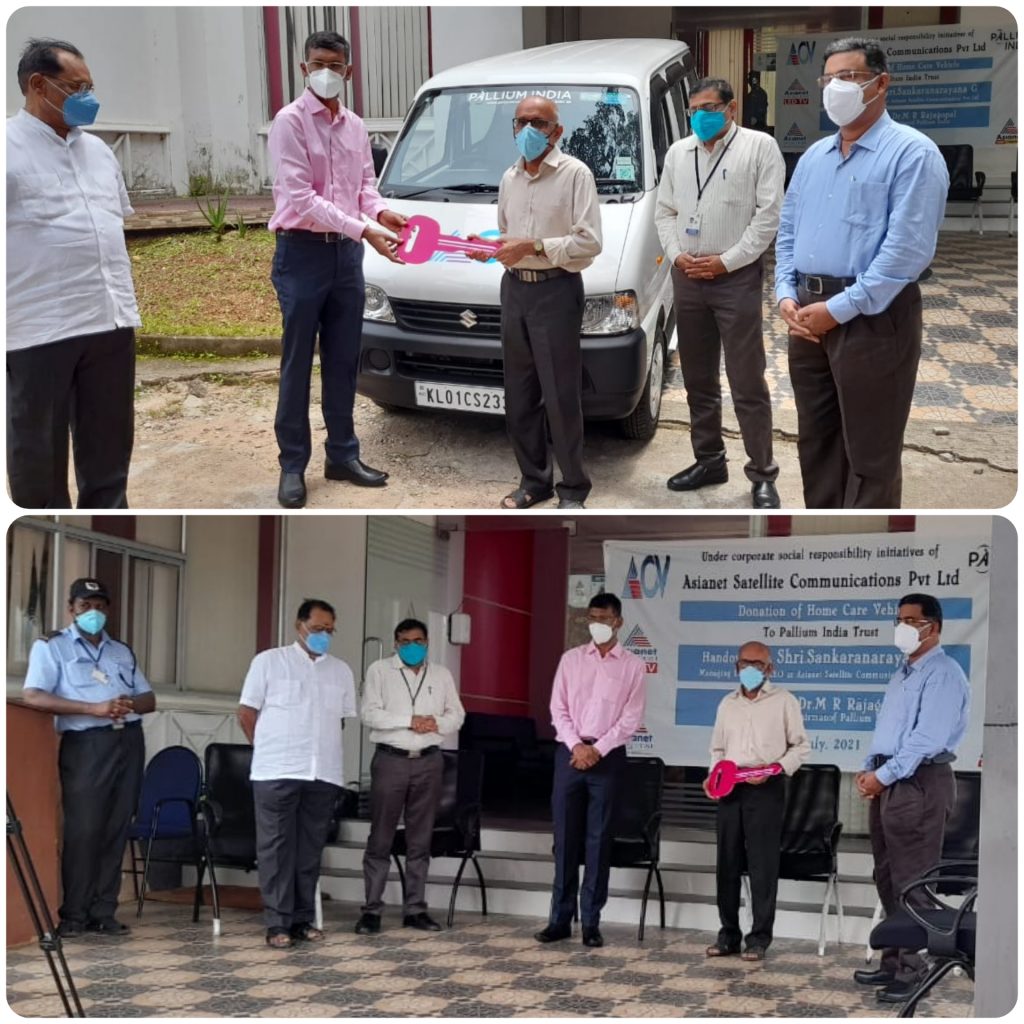
Thank you, Asianet Satellite Communications Pvt Ltd
Mr Sankaranarayana G, (MD & CEO) and all at Asianet Satellite Communications Pvt Ltd, thank you for your kindness.
You had given us a generous grant earlier this year from your corporate social responsibility (CSR) program. That was so very helpful in the context of the challenges offered by the pandemic.
And this car that you have given us on 22 July, is going to take much-needed healthcare across to people who are home-bound and cannot get relief from suffering unless we reach them where they are.
We look forward to our work together.
Click here to donate to Pallium India and lend a hand to our activities.
Please note! Bank details have changed for FOREIGN donations:
Account Name: Pallium India Trust
Bank: State Bank of India (code: 00691)
Branch: Delhi
Account No: 40098265669
IFSC Code: SBIN0000691
SWIFT Code: SBININBB104
Lessons from PAHO
The Pan-American Health Organisation (PAHO), the regional office of WHO, shares with us their recent publication, Regulatory System Strengthening in the Americas: Lessons Learned from the National Regulatory Authorities of Regional Reference.
This report aims to improve understanding of national regulatory remits and capacity in the Americas, raise awareness of regional regulatory progress and challenges, identify the regulatory issues emerging markets will bring, and highlight opportunities for evidence-based regulatory system strengthening. It includes an overview of the market outlook and economic integration mechanisms in the Americas and their influence on regulatory policy and pharmaceutical trade.
Thank you Mylena Pinzón, for sharing this.
To Err Is Human, to Apologize Is Hard
“We empathize with our doctors at the same time that we are hurting as patients. We see ourselves in their weary eyes, as the laboratory results and portal messages pile up, pulsing in their consciousness while their children play in the background of a professional tsunami. The pandemic has ravaged what little is left of their boundaries as patients’ needs have skyrocketed while the hours in the day remain fixed. We understand that they too are hampered by the shift from human encounters to a virtual reality where nuances are lost amidst weak signals and poor connections.” Thalia Margalit Krakower, MD writes in JAMA.
What the post-Covid doctor must know
Covid should catalyse changes in medical education, enhance the profession’s orientation towards scientific sensibility and compassion. K Srinath Reddy, President of Public Health Foundation of India (PHFI), writes:
Doctors are Covid’s collateral damage
“Since the time the pandemic has set in, there has been no time for self-care — exercise, sleep, eating on time and spending time with family. This does take a toll on our personal health too. After a while, the emotional burden and physical strain becomes too much to bear. Warriors also fall ill.” Read more
PARTING SHOT
In Memory of G: A Global Call to Action Against Cervical Cancer
I met her on March 10, 2017, at Jungle Retreat, our beloved family wildlife coexistence lodge, where she had arrived for a holiday.
You know that feeling when you meet someone and instinctively know that you’re going to be really good friends? Or even if you don’t speak every day, there’s something about them that resonates at an inexplicable level?
That’s exactly what happened.
Over the next 5 years, we kept in touch almost every week. We exchanged mundane details, book titles, poetry, photographs, and experiences that made up the fabric of our lives. We never met each other again, not physically at least, but every time either of us experienced something that made us light up with wonder or joy, or moved us profoundly, or was really silly but made us laugh, we would share it with each other.
It was a bond that occupied a space somewhere between friendship, sisterhood, and something deeper. A tribe of two.
[…]
Today, her ashes were laid to rest. Immersed in the Pangong So in Ladakh, as per her wishes. Her father—a man I had never spoken with till 27 days ago, when I heard of her death—called me. He addressed me as “beta”—child—and sent me pictures of her final resting place. A confluence of water, air, and earth, where a lake of impossible aquamarine hues is nestled in the lap of the tallest mountains in the world, under the biggest sky. Of course, that is where she should rest.
She was 38.
Read the complete article written by Smriti Rana and published in ASCO Connection.
Thank you for reading our newsletter. Read previous issues here
Have feedback? Let us know. Leave a reply here or write to us: [email protected]


